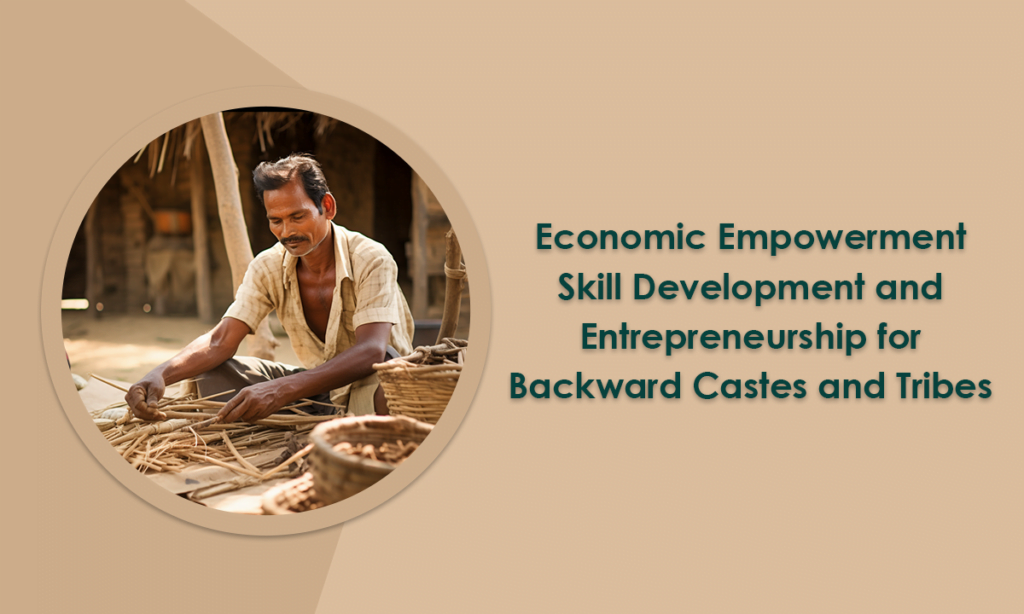Introduction
India’s backward castes and tribes have long faced social and economic challenges, hindering their progress and overall development. Economic empowerment through skill development and entrepreneurship is a critical approach to uplift these marginalized communities, providing them with opportunities to break free from the cycle of poverty and discrimination.
This blog post explores the hardships faced by backward castes and tribes and delves into the importance of skill development and entrepreneurship in empowering these communities.
The Hardships Faced by Backward Castes and Tribes
Backward castes and tribes in India encounter numerous hardships, contributing to their socio-economic marginalization:
Poverty: A significant percentage of backward caste and tribal communities live below the poverty line, struggling to meet basic needs like food, shelter, and education.
Limited Access to Education: Educational opportunities are often scarce for these communities, leading to lower literacy rates and limited exposure to skill development.
Unemployment and Underemployment: Lack of skills and opportunities result in high unemployment and underemployment rates among backward castes and tribes.
Discrimination: Prejudice and discrimination based on social background further limit access to opportunities, resources, and economic growth.
Land and Livelihood Issues: Tribal communities often face land rights issues, displacement due to development projects, and disruptions to their traditional livelihoods.
The Role of Skill Development
Skill development programs play a pivotal role in empowering backward castes and tribes by addressing the following challenges:
Bridging the Skills Gap: Skill development programs equip individuals with relevant skills to meet the demands of the job market, reducing unemployment and underemployment.
Enhancing Employability: Training in various trades and industries enhances the employability of individuals, enabling them to secure better-paying jobs.
Encouraging Entrepreneurship: Skill development fosters entrepreneurship by empowering individuals to start their own businesses and create employment opportunities.
Improving Livelihoods: With improved skills, individuals from these communities can explore diverse livelihood options, making them more financially independent.
The Importance of Entrepreneurship
Entrepreneurship serves as a key catalyst for economic empowerment among backward castes and tribes for the following reasons:
Creating Local Employment: Entrepreneurs from these communities can create job opportunities within their local communities, uplifting others and fostering economic growth.
Fostering Innovation: Entrepreneurship encourages innovative solutions to local challenges, driving economic development in rural and tribal areas.
Economic Self-sufficiency: Successful entrepreneurship allows individuals to achieve financial independence and self-sufficiency, breaking free from poverty.
Promoting Cultural Identity: Entrepreneurship can help preserve and promote the unique cultural identity of these communities through art, crafts, and traditional practices.
Government Initiatives and Impact
The Indian government has undertaken various initiatives to promote skill development and entrepreneurship among backward castes and tribes:
Pradhan Mantri Kaushal Vikas Yojana (PMKVY): Launched in 2015, PMKVY aims to provide skill training to over 10 million youth across India, with a special focus on marginalized communities.
Stand Up India Scheme: This initiative supports entrepreneurship among Scheduled Castes, Scheduled Tribes, and women by providing loans for starting new ventures.
National Scheduled Castes Finance and Development Corporation (NSFDC): NSFDC offers financial assistance and skill development training to empower backward castes economically.
Tribal Cooperative Marketing Development Federation of India (TRIFED): TRIFED promotes entrepreneurship among tribal communities by providing training, market access, and capacity-building support.
Conclusion
Economic empowerment through skill development and entrepreneurship is vital to uplift backward castes and tribes in India, fostering self-sufficiency, innovation, and social progress. By addressing the hardships faced by these communities and providing them with opportunities to enhance their skills and explore entrepreneurial endeavors, India can work towards a more inclusive and equitable society.
Through continued government support, public-private partnerships, and awareness programs, we can pave the way for a brighter future, empowering these communities to thrive and contribute significantly to India’s economic growth and cultural diversity.

Pingback: From the Annihilation of Caste to Constitutional Morality: Key Learnings from Ambedkar - Sankalp Bhoomi Trust
Pingback: Unmasking a Silent Crisis: Female Foeticide in India's Remote Regions - Sankalp Bhoomi Trust